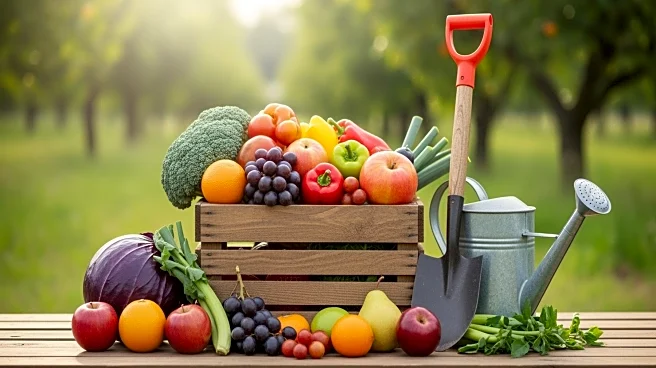What's Happening?
On October 24, 2025, during the Norman E. Borlaug International Dialogue, Chef José Andrés, along with 28 World Food Prize Laureates, issued a joint statement urging a doubling of investments in emergency
food aid and sustainable agriculture. The statement emphasizes the collective responsibility to address global hunger and calls for actionable commitments rather than mere rhetoric. Andrés, known for founding World Central Kitchen, highlighted the organization's efforts in providing meals during crises worldwide. The dialogue also featured discussions on regenerative farming, agriculture's role in peacebuilding, and innovations in animal agriculture, underscoring the need for diverse approaches to transform global food systems.
Why It's Important?
The call for increased investment in food aid and sustainable agriculture is significant as it addresses the urgent need to combat global hunger and food insecurity. By advocating for these investments, the initiative aims to strengthen food systems, making them more resilient to crises such as climate change and conflicts. This could lead to improved food security and economic stability in vulnerable regions. The involvement of influential figures like Chef José Andrés and the World Food Prize Laureates adds weight to the call, potentially influencing policymakers and stakeholders to prioritize these issues. The focus on sustainable practices also aligns with global efforts to achieve environmental sustainability and reduce the agricultural sector's carbon footprint.
What's Next?
The joint statement by Chef José Andrés and the World Food Prize Laureates is likely to prompt discussions among international policymakers and organizations about increasing funding for food aid and sustainable agriculture. Stakeholders may explore partnerships and collaborations to implement the proposed investments. Additionally, the dialogue's emphasis on diverse agricultural practices could inspire further research and innovation in the sector. As the global community continues to face challenges related to food security, the outcomes of this dialogue may influence future policies and initiatives aimed at addressing these issues.
Beyond the Headlines
The advocacy for increased food aid and agricultural investment highlights broader ethical and social dimensions, such as the right to food and the importance of community-driven solutions. By emphasizing local empowerment and sustainable practices, the initiative encourages a shift towards more equitable and inclusive food systems. This approach not only addresses immediate needs but also fosters long-term resilience and self-sufficiency in communities. The dialogue's focus on youth involvement and education further underscores the importance of engaging the next generation in addressing global challenges, ensuring that future leaders are equipped to continue these efforts.











